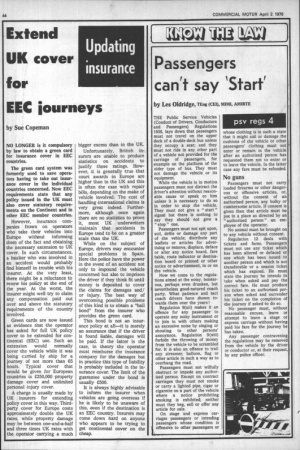Passengers can't say 'Start'
Page 46

If you've noticed an error in this article please click here to report it so we can fix it.
by Les Oldridge, TEng (CE!), MIMI, AMIRTE
psv regs 4
THE Public Service Vehicles (Conduct of Drivers, Conductors and Passengers) Regulations 1936, lays down that passengers must not travel on the upper deck of a double-deck bus unless they occupy a seat; and they must not ride in any other part of a vehicle not provided for the carriage of passengers, for example on the platform of the older type of bus. They must not damage the vehicle or its equipment.
While the vehicle is in motion passengers must not distract the driver's attention without reasonable cause or speak to him unless it is necessary to do so in order to stop the vehicle. They must not give a " start " signal but there is nothing to say they should not give a " stop " one.
Passengers must not spit upon, soil, defile or damage any part of the vehicle; distribute any leaflets or articles for advertising or remove, displace, deface or alter any notice board, fare table, route indicator or destination board or printed or other notice or advertisement, in or on the vehicle.
Now we come to the regulations aimed at the noisy, boisterous, perhaps even drunken, but nevertheless good-natured coach party. What patience and tact coach drivers have shown towards them over the years!
Regulation 9(xii) makes it an offence for any passenger to operate any noisy instrument or to join in with others making an excessive noise by singing or shouting to other persons' annoyance. Regulation 9(xiii) forbids the throwing of money from the vehicle to be scrambled for. It is also an offence to trail any streamer, balloon, flag or other article in such a way as to overhang the road.
Passengers must not wilfully obstruct or impede any authorised person. Except on contract carriages they must not smoke or carry a lighted pipe, cigar or cigarette on a part of the vehicle where a notice prohibiting smoking is exhibited; neither must they beg, sell or offer any article for sale.
On stage and express carriages passengers or intending passengers whose condition is offensive to other passengers or whose clothing is in such a state that it might soil or damage the cushions of the vehicle or other passengers' clothing must not enter or remain in the vehicle after an authorised person has requested them not to enter or to leave the vehicle. In the latter case any fare, must be refunded.
No guns
Passengers must not carry loaded firearms or other dangerous or offensive articles, or, without the consent of an authorised person, any bulky or cumbersome article. If consent is given then that article must be put in a place as directed by an "authorised person" an employee of the operator.
No animal must be brought on to any vehicle without consent.
Regulation 12 deals with tickets and fares. Passengers must not use any ticket which has been altered or defaced or one which has been issued to another person and which is not transferable or a season ticket which has expired. He must state the journey he intends to take when asked and pay the correct fare. He must produce his ticket to an authorised person when asked and surrender his ticket on the completion of the journey if asked to do so.
No passenger must, without reasonable excuse, leave or attempt to leave a stage or express carriage without having paid his fare for the journey he has taken.
Any passenger contravening the regulations may be removed from the vehicle by the driver or conductor or, at their request, by any police officer.




























































































